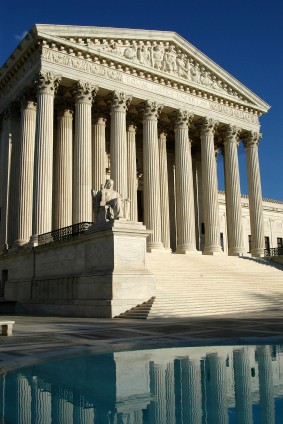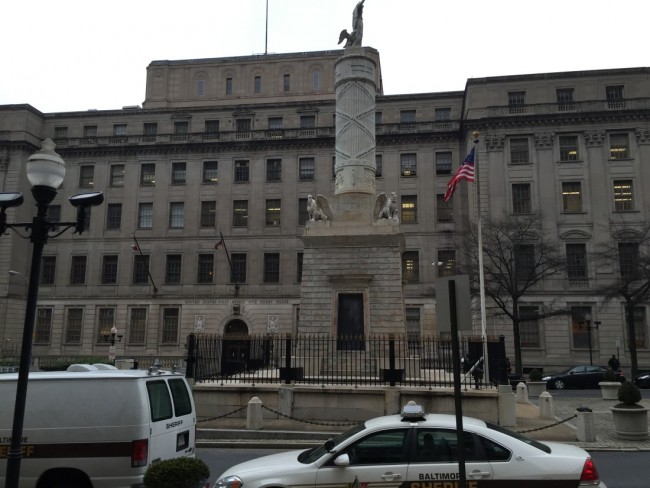Show posts for: Civil Litigation
-
 Read more
Read moreTransition for corporate leadership is frequently complex. When the transition involves a charismatic founder, this step can be even more stressful. Planning well in advance for the inevitable segue between leaders and outlining the respective roles of both new and departing management can help, but may not fully resolve the issues. A recent decision involving Crystal Cathedral Ministries, the megachurch founded by famed televangelist Dr. Robert H. Schuller, reflects how nuanced this process can be. Because this case presents many issues of corporate succession, it provides a gateway for discussing various employment issues that may crop up in a corporate reorganization. We will focus on the case in a series of articles designed to spotlight these issues.
Dr. Schuller founded the Crystal Cathedral in the 1950s. Later, Crystal Cathedral Ministries was formally incorporated in 1970 with Dr. Schuller as the senior pastor. During his 36-year tenure in this position, Dr. Schuller wrote numerous books and gave countless sermons and other talks, particularly in his role as the executive creator and director of content for The Hour of Power, a weekly television show produced by Crystal Cathedral Ministries. In exchange for these services, Dr. Schuller received a salary and benefits, including a housing allowance and health insurance.
-
 Read more
Read moreThe ongoing trial in Ellen Pao v. Kleiner Perkins Caufield and Byers has made headline news across the country. It’s being covered by the Wall Street Journal and USA Today, among other national publications. Those interested in following the trial can monitor the #ellenpao hashtag on Twitter, or watch liveblogs from Re/code or the San Jose Mercury-News.
Why is the trial so newsworthy? As we reported here, Pao claims that Kleiner Perkins, a prominent Silicon Valley venture capital firm, discriminated against her because of her gender and then retaliated because she complained. She claims that she was not promoted to a plum senior partner position because she was a woman, and that the firm fired her because she complained and later sued it. Her story involves sex, boorish behavior, and office intrigue that ranges from the mundane to the highly dramatic.
With that introduction, here are some -- of many -- takeaways for employers from what has transpired thus far:
-
 Read more
Read moreShould executives include an arbitration clause in their employment contracts? There’s no uniform answer, of course. Arbitration proponents cite its speed, cost, privacy, informality, minimal discovery, and limited appellate rights. Opponents cite pretty much the same list. Volumes have been written about whether arbitration is a better form of dispute resolution than litigation, and we can’t resolve that question here.
But thanks to relatively new state laws requiring public disclosure of certain arbitration information, we can look at the question statistically. Even better, people who understand statistics can look at the question statistically, and we can report what they say.
We started by looking at the data set disclosed by the American Arbitration Association (AAA) concerning employment-based arbitrations. (A detailed explanation of the data, and the data itself, is available on this page of the AAA’s website.) One field of the data reports the employee’s salary in four categories: $250,000 or greater; $100,000 to $250,000; $0 to $100,000; and, regrettably, “not provided by parties.” Over the past five years, the AAA database reports about 7700 employment arbitrations (not necessarily separate “cases”; some cases have multiple records, usually reflecting multiple respondents), but only 2912 of these included data for the employee’s salary range. The following table shows the breakout of records by salary range:
Emp. Salary
Number
Pct of Total
$0 to $100,000
2284
78.4
$100,000 to $250,000
412
14.1
$250,000+
216
7.4
Total (excl. no data)
2912
100.0
-
Read more
LSU is used to battling with its Southeastern Conference (SEC) foes on the gridiron. Now, it’s fighting in court with a former assistant who jumped ship to conference rival Texas A&M.
John Chavis, LSU’s ballyhooed former defensive coordinator, left LSU for A&M at the beginning of this year, sparking headlines about “winning big” at his new home in College Station. But storm clouds were brewing – LSU’s athletic director, Joe Alleva, said that he expected Chavis to comply with a $400,000 contractual buyout.
On February 27, Chavis sued LSU in Texas state court, seeking to avoid the buyout. He named A&M as a defendant as well, but only as an “indispensable party,” reported Jerry Hinnen of cbssports.com. The Associated Press reported that A&M agreed to pay the buyout for Chavis if he was found to owe it.
LSU, seeking a home field against Chavis, quickly filed a separate case against him in Baton Rouge, claiming that it is entitled to receive the buyout money.
Chavis’s contract reportedly said that if Chavis left in the first 11 months of his contract, before January 31, 2015, he would have to pay the buyout. The sequence of events appears to be that Chavis gave a required 30-day notice on January 5 that he was resigning and terminating his contract. Chavis says that he left LSU by February 4 – after the January 31 end to the buyout period – and didn’t join the Aggie payroll until February 13.
-
 Read more
Read moreYesterday, the Supreme Court heard argument in the religious discrimination case of EEOC v. Abercrombie & Fitch Stores, Inc., which made our list as one of our five issues to watch for 2015. The case arises under Title VII, the federal law that makes it illegal for an employer “to discriminate against any individual with respect to h[er] compensation, terms, conditions, or privileges of employment, because of such individual’s . . . religion.” The EEOC alleges that Abercrombie, purveyor of “authentic American clothing,” discriminated against Samantha Elauf on religious grounds. The company refused to hire Elauf because she wore a headscarf, or hijab, to her job interview, and the company’s “Look Policy” prohibited employees from wearing “caps.”
In earlier depositions in the case, Elauf’s interviewer at Abercrombie testified that she “assumed that [Elauf] was Muslim,” and “figured that was the religious reason why she wore her head scarf.” The interviewer said that she went to her district manager to discuss the headscarf issue, and told him that “[Elauf] wears the head scarf for religious reasons, I believe.” The interviewer testified that the district manager then told her not to hire Elauf because of the headscarf and said, “[S]omeone can come in and paint themselves green and say they were doing it for religious reasons, and we can’t hire them.” As a result, the interviewer lowered Elauf’s “appearance” score on her evaluation, and Elauf didn’t get the job.
Despite this testimony, the Tenth Circuit still entered summary judgment for Abercrombie, holding that the EEOC’s discrimination claim could not proceed to trial because Elauf “never informed Abercrombie prior to its hiring decision that she wore her headscarf or ‘hijab’ for religious reasons and that she needed an accommodation for that practice, due to a conflict between the practice and Abercrombie’s clothing policy.”
The fact that the Tenth Circuit granted summary judgment, even though the interviewer admitted that she assumed that Elauf wore the scarf for religious reasons, helps explain the concerns, and potential solutions, that the Justices raised in yesterday’s argument.
-
 Read more
Read moreSilicon Valley is buzzing about the trial in Ellen Pao v. Kleiner Perkins Caufield and Byers LLP, which got underway on Tuesday. According to USA Today, a UC-Berkeley professor says that you “can’t be within a stone’s throw of the Valley without hearing” about the case.
The cast of characters (described here by the San Francisco Business Times) includes a number of heavy hitters, including Pao herself. Pao, a graduate of Princeton, Harvard Law, and Harvard Business School, is now the CEO of Reddit. Kleiner Perkins is a well-known venture capital firm in Menlo Park, a city that has been described as the “center of the venture capital universe.”
Pao’s allegations are explosive. She contends that she had a brief affair with a married junior partner who continued to harass her after she broke off their relationship. Her claims about the firm go deeper than just this harassment; she contends that the firm had an overarching culture of discrimination against women, culminating in her dismissal in October 2012.
-
 Read more
Read moreAn earlier generation of Baltimore lawyers used to say that the outcome of a case should not depend on which side of Calvert Street it was filed. This made sense when the federal court was on the east side of Calvert and the state court on the west. The statement was a colloquial expression of the Erie doctrine, which requires federal courts to apply state law when federal jurisdiction depends on diversity of the parties’ citizenship.
The Erie doctrine requires federal judges to figure out how state judges would rule in certain matters. You might imagine a federal judge strolling across Calvert Street to ask for some advice. But that’s not how state and federal judges speak to one another (and not just because the federal court long ago moved to a dismal building on Lombard Street).
Instead, federal judges read the published judicial decisions from the state whose law applies. Under Erie, federal judges are required to follow the holding of decisions from the state’s highest court. They are not required to follow “dicta” – statements in a judicial opinion that are not necessary to the outcome. In many cases, the state’s highest court has not ruled on the particular legal question at issue. In that event, the federal court must predict how the state court would rule based on other sources of state law. One of those sources is “considered dicta” (or well-reasoned dicta) from the decisions of the state’s highest court.
-
 Read more
Read moreThe Sarbanes-Oxley Act’s whistleblower protection provision, 18 U.S.C. § 1514A, allows a wrongfully terminated whistleblower to recover “all relief necessary to make [her] whole.” 18 U.S.C. § 1514A(c)(1). The statute then goes on to say that compensatory damages include reinstatement, back pay, and “special damages,” including expert fees and reasonable attorneys fees. In an opinion issued this week, the Fourth Circuit held that Sarbanes-Oxley damages don’t just include these enumerated damages. Rather, an employee can obtain other compensation for harm, including emotional distress damages. Jones v. SouthPeak Interactive Corp. of Delaware, Nos. 13-2399, 14-1765 (4th Cir. Jan. 26, 2015).
The plaintiff in the case, Andrea Gail Jones, was the former chief financial officer of SouthPeak, a video game manufacturer. According to the opinion, in 2009, SouthPeak wanted to buy copies of a video game for distribution, but didn’t have the cash to buy the games up front. Instead, SouthPeak’s chairman, Terry Phillips, personally fronted Nintendo over $300,000. When SouthPeak didn’t record this debt, Jones raised a stink, eventually telling the company’s outside counsel that the company was committing fraud. The same day, the company’s board fired her.
-
Read more
Last November, we covered the Supreme Court oral argument in the case of Department of Homeland Security v. MacLean. As a refresher, MacLean was an air marshal who was fired by the Transportation Security Administration (TSA) after he blew the whistle to MSNBC on the agency’s plan to cancel marshal missions to Las Vegas. After the argument, Prof. Steve Vladeck of American University predicted that the TSA would lose the case.
He was right. On Wednesday, the Supreme Court issued its opinion, in which it held in favor of MacLean. The TSA argued that it could fire MacLean because his disclosures were “specifically prohibited by law” in two ways: first, it had adopted regulations on sensitive security information, which applied to the information MacLean disclosed; second, a provision of the U.S. Code had authorized TSA to adopt those regulations. Chief Justice Roberts, writing for the Court, rejected both arguments.
As to the regulations, he wrote, Congress could have said that whistleblowers were not protected if their disclosures were “specifically prohibited by law, rule, or regulation,” but did not. Thus, its choice to only use the word “law” appeared to be deliberate. Further, interpreting the word “law” broadly “could defeat the purpose of the whistleblower statute,” because an agency could insulate itself from liability by promulgating a regulation that prohibited whistleblowing. And as to the argument that Congress-passed “law” prohibited the disclosure, Chief Justice Roberts wrote that the statute in question did not prohibit MacLean’s disclosures. Instead, it was the agency’s exercise of discretion, not the statute, that determined what disclosures were prohibited.
-
Read more
The hacking of Sony’s private data has been one of the biggest stories in the country over the past couple of months. It won’t surprise anyone to learn that lawsuits have been filed over the breach. Indeed, the plaintiffs in several class action lawsuits are seeking to consolidate their cases into one massive Sony Data Breach Litigation case.
So far, the plaintiffs in those cases haven’t alleged claims against individual Sony officers or directors. This begs a couple of questions: is that something that plaintiffs do? And what kinds of allegations can they bring?
The answer is that a number of plaintiffs have brought claims against officers and directors who worked at companies that suffered data breaches. Typically, they allege that the defendants did not properly manage the company’s cyber risks.
For example, in February 2014, Kevin LaCroix of D&O Diary brought to our attention lawsuits that Target shareholders filed against the company’s officers and directors, arising from the massive theft of Target’s private customer information. The shareholders alleged that the company’s executives and board knew how important the security of private customer information was, and failed to take reasonable steps to put controls in order to detect and prevent a breach. Further, they alleged, the defendants exacerbated the damage by publicly minimizing the breach.
As the regulatory and business environments in which our clients operate grow increasingly complex, we identify and offer perspectives on significant legal developments affecting businesses, organizations, and individuals. Each post aims to address timely issues and trends by evaluating impactful decisions, sharing observations of key enforcement changes, or distilling best practices drawn from experience. InsightZS also features personal interest pieces about the impact of our legal work in our communities and about associate life at Zuckerman Spaeder.
Information provided on InsightZS should not be considered legal advice and expressed views are those of the authors alone. Readers should seek specific legal guidance before acting in any particular circumstance.
Contributing Editors

John J. Connolly
Partner
Email | +1 410.949.1149

Andrew N. Goldfarb
Partner
Email | +1 202.778.1822

Sara Alpert Lawson
Partner
Email | +1 410.949.1181

Nicholas M. DiCarlo
Associate
Email | +1 202.778.1835




